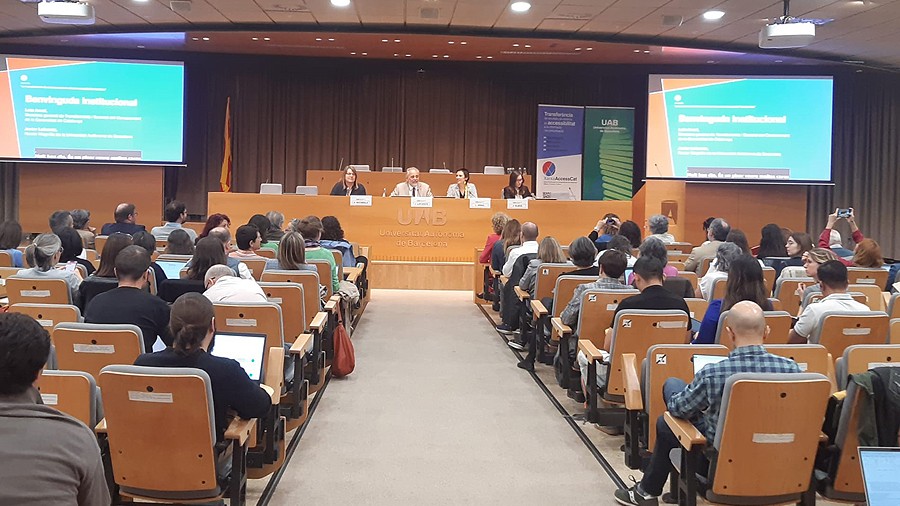Knowledge transfer in Social Science and the Humanities: a need to broaden traditional approaches
On 9 May a conference organised by the AccessCat Network, coordinated by the UAB, took place at the Rectorat building with researchers and technicians who debated on the importance of knowledge transfer in the social sciences and the humanities, in terms of their social impact and values and the need to establish systems and resources for their institutional recognition.

The speeches forming part of the conference on "Knowledge transfer in the social sciences and humanities", both in the round tables and in the talks, showed the need to have a broad vision of what knowledge transfer in the social sciences and humanities (SS&H) implies, and to have a system that allows all this diversity to be accepted, to evaluate it with agreed quantitative and qualitative indicators and to provide recognition for the researchers carrying it out. It also became obvious the need to use terminology in which research personnel in these fields feel comfortable, speaking of co-creation and co-construction of knowledge, of users and of social impact and value. To train and raise awareness among research personnel themselves that what they are doing, often without realising it, is transferring their knowledge and impacting society. And that those in these fields who want to transfer knowledge can count on tools and institutional professionals who recognise their uniqueness and can provide them with support.
The rector of the UAB, Javier Lafuente, opened the conference claiming "the fundamental role of the social sciences and humanities in explaining the social impact of universities" and advocated promoting dialogue between disciplines to analyse phenomena and provide solutions "if we want to move towards a more inclusive, sustainable and collaborative science, open to citizens and for the benefit of society". To fully achieve this goal, "we must recognise and strengthen the transfer aspect of the social sciences and humanities and, above all, it is necessary that the criteria and procedures for evaluating the transfer take into account the particularities of these areas of knowledge," he said.
For her part, the director general of Knowledge Transfer and Society, Laura Arnal, called for breaking "false and fatal myths" about the existence of a technology transfer "with glamour" and another considered "the poor sister". Arnal highlighted the "great transversal impact" that knowledge transfer from the SS&H has in many areas of society and the need "to adapt the current system so that those who do research in SS&H feel at home". This system has matured and now has the "necessary elements" and a "culture that is permeating" to support it, he mentioned. The new Catalan science law calls for the deployment of a new model to evaluate the impact of research results in the social sphere. "It is a commitment that we all have to work on together," he concluded.
Creation of social value
The speaker of the conference, Julia Olmos, professor of Business Organisation and member of INN4ALL, the Innovation, Science and Society research group of the University of Valencia, began her talk by pointing out that it is necessary not to put a "restrictive approach" when we talk about transfer, equating it to commercialisation, but to broaden the focus to be able to name what is being done in SS&H, which is to bring knowledge to society, creating a social value (which can also be economic), as is being requested by the European Union in its calls for proposals.
"There are problems when it comes to understanding or evaluating transfer," said the researcher, an expert in studying the social valorisation of research in SS&H, at the end of her explanation of the results of the analysis of the pilot project of the six-year transfer project promoted by ANECA in 2018, a call to which 16,000 applications were submitted, and of the EXTRA research project, in which they analysed 11,000 questionnaires conducted with researchers. Of the applications submitted to the pilot project, 43% were approved, 41% of which corresponded to the SS&H fields. The results showed a greater consensus in approving the most institutionalised and most consensual transfer activities (85% for spin-offs compared to 31% for publications and dissemination); a great disparity of results between disciplines; and a predominantly male profile, over 50 years of age and from the highest academic scales. The second project showed that SS&H sector does not generally collaborate with companies, but with other types of actors, such as public administrations, non-profit institutions and associations.
"There are many ways to reach society and there are many and diverse social agents," said Julia Olmos, who stressed the importance of designing "calls for proposals that are fair for all areas of knowledge" and of raising awareness among the group with workshops and training. In addition, institutions have to know, guide and see the potential of their research groups to support them and design facilitating processes and procedures. "Conferences like this one should allow us to move towards broad approaches where all disciplines have a place," concluded the researcher.
Speakers and lecturers of the conference, alongside UAB Vice-Rector for Innovation, Transfer and Entrepreneurship Rosa Maria Sebastián, and Catalan Government Director General of Knowledge Transfer and Society Laura Arnal.
Anna Matamala, coordinator of the AccesCat Network, organiser of the conference, mentioned in her conclusions terms and concepts that had emerged throughout the meeting and that she considered key, including broad vision, co-construction or co-creation, transformation, multidirectionality, link with the territory, recognition, contribution of value, language, indicators, social impact, multidisciplinarity and qualitative/quantitative evaluation.
Finally, Vice-Rector for Innovation, Transfer and Entrepreneurship Rosa Maria Sebastián thanked the organisers for the conference and pointed out the learning it entailed. "We have work ahead of us, both from the government and from the universities. We will continue this feedback we received today and that we had already begun in our UAB faculties. We have to become more involved with our researchers so that they can value their work and help them have an impact on the surrounding region," she concluded.